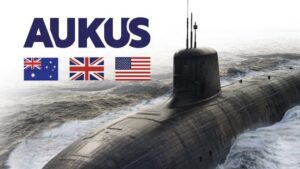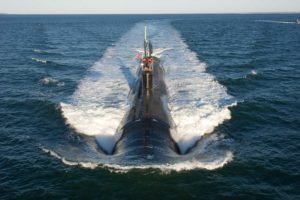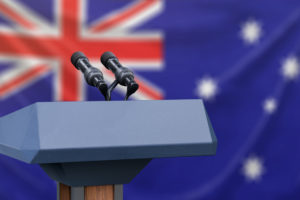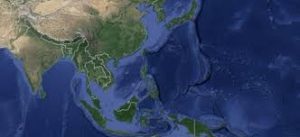[March 2023]
Introduction
While the delivery aspect of AUKUS – that is of nuclear-propelled submarines and advanced technological capabilities – continues to cause frenzy in the international arena, the global recalibration of security relationships at the heart of the pact will be the most world-altering element. This essay reflects on the implications of AUKUS as a pillar of the Joe Biden administration’s strategy for an “update[d]” liberal order – named LIO 2.0 here by the authors. Although the trans-Atlantic bloc is currently committed to containing Russia’s military forces in Ukraine, with NATO enjoying a renaissance of sorts, US longer-term interests are unwaveringly centred on the Indo-Pacific region and strategic competition with China will remain pivotal.
Against this strategic context, this essay unpacks the dilemma faced by AUKUS through a world order studies perspective. At a time when the US is seeking to draw existing allies closer to its sphere of influence, the rationale of AUKUS is one of exclusion; that is, a coalition-building project around strategic technology development formed by three among the closest partners in the international arena. This exclusive approach has clear benefits for Washington, Canberra and London, not only in terms of military burden sharing and interoperability, but also in terms of alliance building and deepening trust on a diplomatic level. However, there are risks to this approach if the trio aspire to be seen as legitimate actors in the region, rather than as external, hegemonic players.
From Inclusion to Exclusion in US Grand Strategy
When AUKUS was first launched by the US, Australia and the UK, both politicians and commentators alike tended to emphasise its technological outputs and the procurement aspect, especially regarding the next-generation submarines. In their live address in September 2021, Australian then prime minister Scott Morrison highlighted the role of “technology, …scientists, …industry”; British then prime minister Boris Johnson noted that AUKUS will be “one of the most complex and technically demanding projects in the world, lasting for decades and requiring the most advanced technology”; and President Biden emphasised the importance of “modern capabilities” to address “rapidly evolving threats”. The need for top-notch weapons, however, did not justify the unusual fanfare around AUKUS, with its launch immediately generating controversy and dividing a number of governments into either supporter or detractor camps.
After the launch, new questions soon emerged about what the agreement wanted to be. Many saw in it a geostrategic move to counter the growing assertiveness of China in the IndoPacific. Yet, this is not how AUKUS was introduced in September 2021. Johnson’s speech emphasised that AUKUS was going to create “hundreds of highly skilled jobs across the United Kingdom”; Morrison’s did not provide any clear insight into AUKUS other than the objective of submarines. Biden was the only leader to explicitly offer a geopolitical vision. He stated that AUKUS represented a “new phase of the trilateral security cooperation”, and that this new platform is about “investing in our greatest source of strength – our alliances – and updating them to better meet the threats of today and tomorrow”. He also emphasised the importance of “connecting America’s existing allies and partners in new ways and amplifying our ability to collaborate”.
These ambiguous illustrations of what AUKUS represents beg the question of what has driven Washington’s new emphasis on alliance building? AUKUS is primarily aimed at containing the erosion of the US-led global sphere of influence – or, US leadership within the LIO – with this in decline amid growing multipolarity. The origins of multipolarity, which ensued after the short period of unipolarity in the 1990s following the Soviet Union’s dissolution, are of course rooted in China’s rapid accession to global economic heavyweight. This perceived challenge, together with the emergence of other Asian ‘tiger’ economies, has harnessed the US to the Indo-Pacific. Indeed, Washington’s strategic tilt was made clear in the 2022 National Strategy, where it referred to “iron-clad commitments” to Indo-Pacific allies.
In contrast to other critical spheres of influence – like those seen in nineteenth century imperialism, or Russia’s enduring monopoly in many former Soviet republics – the US-led sphere has aimed at supporting countries outside of capitalist and democratic systems to embark on free market development models, participate freely in the global economy and construct democratic institutions. Although this integration of often former and potential rivals was always dictated by US-friendly rules, there was nonetheless an element of inclusion.
Since the turn of the century, but particularly in the past decade, the erosion of US power has prompted a critical rethinking of Washington’s grand strategy. In an environment where the US is no longer capable of persuading the international community as it could during the Cold War years, there appears to be a shift towards building a new LIO founded on a logic of exclusion. In fact, this is not unusual or even unexpected; as scholar Kyle Lascurettes has argued, “The propelling motivation for foundational rule building at important historical junctures has most often been exclusionary, not inclusive”.
With US-driven initiatives like the Partnership for Global Infrastructure and Investment (PGII) – previously named Build Back Better World (B3W) – the Quadrilateral Security Dialogue (Quad), the Indo-Pacific Economic Framework (IPEF), and now AUKUS, the Biden administration is effectively creating a LIO 2.0, as a more exclusive club than the original LIO. Above all, this new liberal order seeks to exclude China from accessing sensitive parts of the Western economy and from building military relationships with US allies; but it is also aimed at drawing US allies deeper within a Washington-led diplomatic network. A LIO 2.0 entails a stricter layer of rules with industrial standards that Beijing is unable or unwilling to comply with; and it comprises more exclusive multilateral relationships to procure certain technologies, as well as deeper military interoperability. Such an approach has been described by the Henry Jackson Society as “positive decoupling”.
AUKUS, however, is not just about US hegemony; despite being in a practical sense the ‘junior partners’, Australia and the UK nonetheless have a degree of agency in how the framework works to shape the world order. For Australia, the motivation for membership is driven in large part by the urgent need to prevent a naval capabilities gap by modernising its submarines fleet; for the UK, the motivation is more closely tied to Brexit and its ‘Global Britain’ strategy, which has seen it solicit new trading partners in the Indo-Pacific, as well as inevitably falling in behind American foreign policy in light of the ‘special relationship’.
Although each signatory to the pact has different agendas and reasons for joining AUKUS, the effectiveness of this project lies its exclusivity. In geopolitical terms, the three members are the most powerful states in the Anglosphere and their common historical, linguistic and cultural ties, as well as long history of previous successful cooperation, create an almost organic degree of trust that makes it easy to cooperate over sensitive security and defence matters. However, this may not be enough to prevent domestic constituencies demanding adjustments to the project, especially in Australia, with escalating defence expenditures and concerns about subsidising the US military supply chain through submarines procurement increasingly under scrutiny by the public.
While challenges lie ahead, there clearly is a substantial degree of convergence among the national security strategies of the three members from the point of view of Indo-Pacific security. Indeed, the emphasis on a new LIO and order-engineering are also how AUKUS is interpreted primarily by Chinese observers, who have argued that the US is “trying to regroup its strategic assets from the Cold War to contain China”, and prevent its modernisation.
Alienating Effects of an Enlarged Model of AUKUS
The British scholar John Keiger contends that, “Aukus is not just a coalition of three. It will be the nexus of a much broader web”, and this will be centred on the Indo-Pacific. Yet, at a press conference before the September 2021 launch, a senior US official warned that the US sees AUKUS as a “one-off” which appeared to rule out the option of an enlarged model.
The pros of an exclusive strategy that sees the US coming together with its two closest partners are the possibility of deepening the partnership to the sharpest and most sensitive niche military capabilities. The cons, however, are excluding everyone else, particularly with regards to the long-standing friends of the individual AUKUS partners. Frictions with France proved to be the first Shakespearean dilemma for AUKUS, with Canberra’s decision to renege on its 2016 agreement to purchase French-built diesel-propelled submarines triggering outrage in Paris. The diplomatic rift, which led to France’s temporary withdrawal of its ambassador from Canberra, highlighted the risk of undermining NATO, and also that existing alliances should not be taken for granted.
This alienating effect is especially true in Asia, a region which has historically demonstrated both openness to external influence and strict adherence for its national interests and local traditions. At a time when China – like Russia – has ended up on NATO’s threats list following the 2022 Madrid Summit, and with former British leader Liz Truss and others calling for a “global NATO”, there is a risk that AUKUS, as an Anglosphere strategic construct, might be seen as an ‘Asian NATO’. This would be at odds with a region where socio-political hybridity, cultural diversity, and anti-hegemonism serve as unifying dynamics. While there is not any current imperative for AUKUS to integrate more, for the military power projection to achieve deterrence value, a supportive diplomatic environment will be essential. Indeed, this does not represent a banal detail, but a crucial step to mitigate some of the concerns AUKUS has caused in the region, and in so doing it might need to become more inclusive.
Above all, the power shift will play out in its regional bloc, the Association of Southeast Asian Nations (ASEAN). Chinese scholar Mingjiang Li has argued that ASEAN regional responses to AUKUS can be grouped into three types. In a first group, Malaysia and Indonesia have “openly demonstrated concerns” with regard to nuclear proliferation and arms race; in a second group, countries that tend to be seen as closer to China, such as Thailand, Cambodia, Laos, Brunei and Myanmar, have not delivered any clear-cut comment on AUKUS, although there are more negative than positive signs; in a third group, Philippines, Vietnam, and Singapore were “ostensibly supportive” when the framework was unveiled. Li concluded that AUKUS has been “cautiously accepted” by ASEAN as a whole. Still, if the principle of “ASEAN centrality” means something (and this has been questioned by other scholars), failing to bring ASEAN on board through greater engagement and transparency could undermine the soft power of AUKUS.
New Zealand might appear an obvious AUKUS candidate as an existing member of ANZUS and Five Eyes. Yet immediately following AUKUS’ launch, the then prime minister Jacinda Ardern confirmed that, although greater American and British regional engagement was to be welcome, nuclear-powered submarines would not be allowed within New Zealand’s waters. While this rejection is nothing new and stems from the New Zealand Nuclear Free Zone, Disarmament, and Arms Control Act 1987, there are two contentious aspects that deserve attention: firstly, New Zealand does not want to be directly associated with US or Australian efforts to paint China as an aggressor state; secondly, the country does not have anything like the military capabilities of the three AUKUS partners, not even Australia.
From a security point of view, South Korea and Japan are more logical candidates. Some have speculated there may be greater Korean-US defence cooperation in the future, with the new president Yoon Suk-yeol expressing a clear interest in joining both the Quad and AUKUS. However, others have expressed concerns that defence integration would erode South Korean sovereignty. For the time being South Korean elites can be expected to closely monitor the implications of AUKUS on US-Australia relations, especially in light of internal faultlines on South Korea’s foreign policy direction. But this is exactly what could decrease the appetite of Washington, Canberra and London for enlargement; the advantage of minilateralism is to allow for greater freedom and effectiveness during decision-making.
Similar speculation arose about Japan when AUKUS was launched. While greater contribution to Indo-Pacific security by the AUKUS partners was well received in Tokyo, there appeared to be more doubts about the specific issue of submarines. Firstly, it was noted that Japan will need nuclear-powered submarines only if it decides to play a more assertive role in the South China Sea and contribute to deterrence efforts in the area, but these are unlikely to be necessary in the East China Sea – due to shallow waters and the proximity to Japan. Secondly, like South Korea, integrating defence capabilities would pose sovereignty issues. Nevertheless, the UK and Japan signed a defence pact in January 2023 that allows two-way military deployments – highlighting that Tokyo is willing to act assertively to counter China’s rise. This development followed the UK, Japan and Italy signing an “international coalition” agreement in December 2022 on the Global Combat Air Programme (GCAP), with the three partners to collaborate on “next-generation fighter aircraft” by 2035.
Finding Equilibrium between Inclusion and Exclusion in the Indo-Pacific
Given the complicated nature of acceptance for many Asian countries, the road ahead will be bumpy for AUKUS. Concessions may be the only way for AUKUS to elicit interest from the rest of Asia, but even without any enlargement, China will remain highly suspicious of the pact. Moreover, the possibility of developing AUKUS from a trilateral to a multilateral format would be contingent on the domestic politics of several Asian countries. While public acceptance is also vital in the three existing AUKUS members (especially with all these being democracies), such destabilising forces in the Asian context are likely to dilute rather than deepen the partnership.
It is therefore legitimate to wonder whether AUKUS could better integrate with the region it wants to project its influence on. Will the partnership incorporate new members, and is it designed to do so? The sensitive technology that AUKUS deals with suggests it may be difficult for other countries to participate in AUKUS without getting access to the whole package, but perhaps defence engagement and transparency without any formal membership or interoperability with other parties are some of the compromises that could be achieved. This would also depend on which Indo-Pacific countries could be interested in joining AUKUS. Assuming that these would not come from the inner circle of Asia – ASEAN’s members – these are more likely to emerge from the outer circle where the US, Australia and the UK enjoy greater influence.
Within the core layer, represented by ASEAN, adherence to AUKUS is likely to be close to zero; while within the external layer, new members could potentially emerge, most likely Japan, South Korea and New Zealand, but also Canada as another Pacific coastline state. Furthermore, there might be a spectrum to the criteria for membership and security tasks. In between these two layers, perhaps, lies India. New Delhi is also commissioning nuclearpowered attack submarines, and it might be a potential candidate; yet, given its strategic autonomy and a peculiar relationship with China characterised by both cooperation and competition, there remains a degree of uncertainty.
At one end of the spectrum there is enlargement intended in the narrowest sense. This would see the integration of new members with equal status of the existing three. This type of membership would involve a high degree of trust – in the vein of that between Washington, Canberra and London – in order to gain access to the whole AUKUS package. If this was the criteria and if AUKUS was to only focus on strategic armaments, it is likely that Japan would be the only possible partner.
If the criteria for membership were looser, this could also allow South Korea to join, and, if the core business of AUKUS was to enlarge to non-traditional security issues, this could also include countries like Singapore and other ASEAN members, in addition to New Zealand and Canada. Between these two options at either end of the spectrum, there are other possibilities. One option is that of external partnerships. NATO for instance, has maintained relationships with non-member countries through the Euro-Atlantic Partnership Council (EAPC), which allows for some limited security and defence collaboration. Another option would be of exploratory memberships, enabling interested parties to explore and negotiate details of an eventual full membership at the end of a transitionary period – rather like the journey that most European countries have historically taken before joining the European Union (EU).
In fact, an AUKUS Plus could even serve as a platform to increase the pact’s soft power across the region should the pact include a non-traditional security agenda. This could create synergies with the EU’s new ‘Strategy for Cooperation in the Indo-Pacific’, launched the day before AUKUS and which also focuses on human security. However, this development might lead to AUKUS being a duplication of the Quad, though the two frameworks could potentially fuse into one broad multilateral institution focused on regional development. Nevertheless, this scenario appears highly unlikely at the current juncture, not least as Washington would see little use for it.
The Australian scholar Clinton Fernandes has drawn attention to how AUKUS will lock in Australia’s dependence on the US, and it can be argued that the UK and potential new members face the same dilemma. According to Fernandes, Australia’s reflexive protection of American interests in the Indo-Pacific render it a “a subordinate beneficiary of the US empire”. The problem with AUKUS, Fernandes contends, is that it accelerates this “structural dependence” on Washington, where it will become only possible to defend oneself “in the context of the US alliance”. If one follows this argument, any new joiners would lose agency in their foreign policy decisions and security posture, and particularly so if the nature of their membership were to involve deepening military interoperability. Fernandes also highlights the inherent contradiction at the heart of the AUKUS project with its rhetoric on trade. For Australia, like the rest of Asia, China is a major trading partner which has the ostensibly absurd outcome that AUKUS is about “protecting trade with China from China”.
Even without an enlargement, AUKUS poses the risk of accelerating competition between regional powers for military superiority. Even if individual actions are characterised by the AUKUS members as providing deterrent value and are necessary for security, the classic security dilemma in fact can lead to an upwards trajectory in the security posture of other states, namely China, as each side takes further defensive actions aimed at countering the other side. Indeed, the line between offensive and defensive actions is far from clear. There is a risk that rather than checking China’s territorial ambitions, AUKUS will put the US and its allies on a collision course in the Indo-Pacific. As such, it may be more pragmatic for the US to refocus its engagement in the Indo-Pacific towards encouraging de-escalation and seeking out cooperation with China in some specific areas, most obviously these being economic development of poorer regions and collaboration over the path to net zero.
Conclusion
Notwithstanding the stir over plans for next-generation submarines and advanced capabilities, AUKUS stems from a logic of order-engineering and represents a pillar in the US grand strategy to build a LIO 2.0. The geographical pivot of this strategy has been, since Obama launched his “pivot to Asia”, the Indo-Pacific region. However, the exclusive nature of AUKUS might be at odd with its order engineering strategy, as Asian countries reflect on the implications of the pact for their region. Perhaps it would be better for the US to redeploy AUKUS to narrow areas of trilateral technology collaboration and redouble diplomatic efforts on strengthening ASEAN as a stabilising force in the region rather than sewing divisions.
While AUKUS has certainly been designed with an exclusive logic, the three members of the pact may not hold all the cards. The AUKUS deal has served as a reminder that the Asian order, in comparison to the trans-Atlantic bloc, remains more politically hybrid and geopolitically fragmented. To an extent, diversity has been one of the greatest assets of Asia in recent decades – with state-led types of capitalism that have spurred economic growth across the region. However, such diversity is also a reminder that the legitimacy and success of AUKUS cannot be taken for granted.









